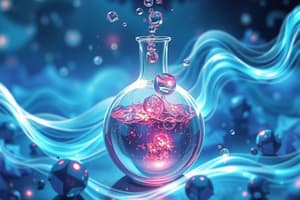Podcast
Questions and Answers
Describe the formation of different types of solutions.
Describe the formation of different types of solutions.
Different types of solutions are formed through processes such as dissolution, dispersion, and ionization.
What are colligative properties of solutions and how are they related to the molar masses of the solutes?
What are colligative properties of solutions and how are they related to the molar masses of the solutes?
Colligative properties of solutions are properties that depend on the number of solute particles, rather than their identity. These properties include boiling point elevation, freezing point depression, and osmotic pressure. The colligative properties are directly related to the molar masses of the solutes.
Explain the difference between ideal and non-ideal solutions.
Explain the difference between ideal and non-ideal solutions.
Ideal solutions are those that obey Raoult's law, which states that the vapor pressure of a component in a solution is directly proportional to its mole fraction. Non-ideal solutions deviate from Raoult's law due to factors such as intermolecular interactions and molecular size differences.
What is Henry's law and how does it relate to the solubility of gases in liquids?
What is Henry's law and how does it relate to the solubility of gases in liquids?
Explain the abnormal colligative properties exhibited by some solutes in solutions.
Explain the abnormal colligative properties exhibited by some solutes in solutions.
Flashcards are hidden until you start studying




